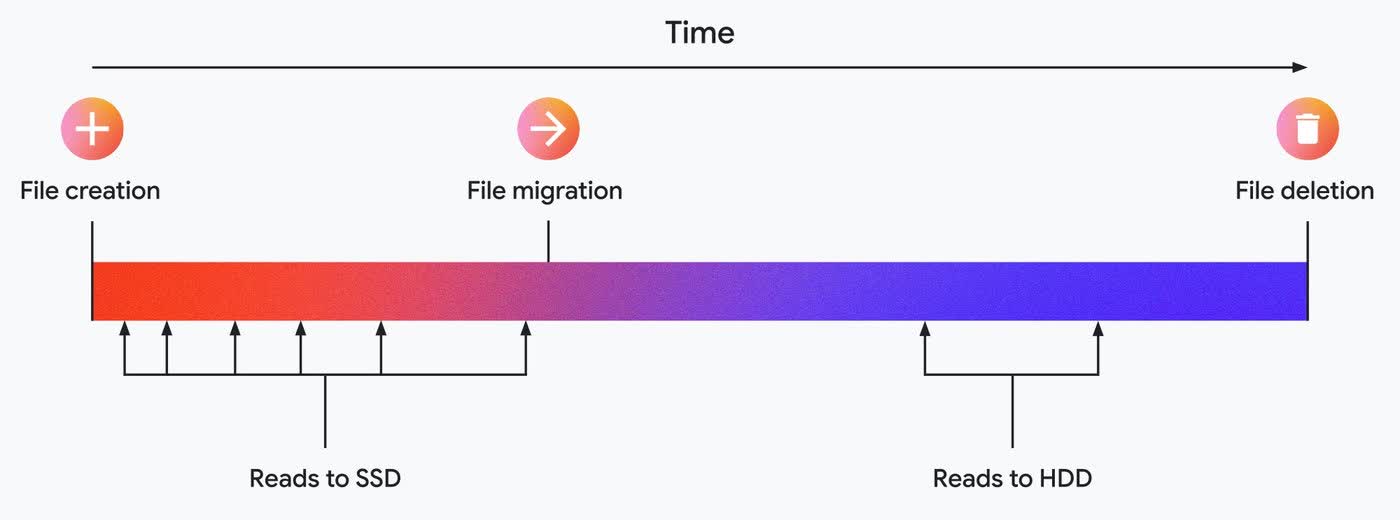Learn extra at:
Editor’s take: In Colossus: The Forbin Mission, a complicated supercomputer turns into sentient and enslaves humankind. Colossus can also be the title of the storage platform the place virtually all of Google’s web providers reside. Although we do not know if the corporate took direct inspiration from the traditional sci-fi film, the connotations are nonetheless current.
In a current weblog publish, Google revealed a number of the “secrets and techniques” hiding behind Colossus, an enormous community infrastructure the corporate describes as its common storage platform. Colossus is powerful, scalable, and simple to make use of and program. Google mentioned the large machine nonetheless makes use of tried-and-true (but nonetheless evolving) magnetic exhausting disk drives.
Colossus powers many Google providers, together with YouTube, Gmail, Drive, and extra. The platform evolved from the Google File System venture, a distributed storage system for managing massive, data-intensive purposes, making issues extra manageable. Surprisingly, Google supercharged Colossus by putting in an unique cache know-how that depends on quick solid-state drives.
| Instance utility | I/O sizes | Anticipated efficiency |
|---|---|---|
| BigQuery scans | tons of of KBs to tens of MBs | TB/s |
| Cloud Storage – customary | KBs to tens of MBs | 100s of milliseconds |
| Gmail messages | lower than tons of of KBs | 10s of milliseconds |
| Gmail attachments | KBs to MBs | seconds |
| Hyperdisk reads | KBs to tons of of KBs | <1 ms |
| YouTube video storage | MBs | seconds |
Google builds one Colossus file system per cluster in an information heart. Many of those clusters are highly effective sufficient to handle a number of exabytes of storage, with two file methods, specifically, internet hosting greater than 10 exabytes of knowledge every. The corporate claims that Google-powered purposes or providers ought to by no means run out of disk area inside a Google Cloud zone.
The information throughput in a Colossus file system is spectacular. Google claims that the biggest clusters “repeatedly” exceed learn charges of fifty terabytes per second, whereas write charges are as much as 25 terabytes per second.
“That is sufficient throughput to ship greater than 100 full-length 8K films each second,” the corporate mentioned.
Storing knowledge in the appropriate place is important for reaching this type of over-the-top efficiency. Colossus inside customers can dictate if their information must go to an HDD or an SSD, however most builders make use of an automatic answer often known as L4 distributed SSD caching. This know-how makes use of machine studying algorithms to determine what coverage to use to particular knowledge blocks. Nevertheless, the system ultimately writes any new knowledge to the HDDs.
The L4 caching tech can (partially) resolve this downside over time by observing I/O patterns, segregating information into particular “classes,” and simulating totally different storage placements. In keeping with Google’s documentation, these storage insurance policies embrace “place on SSD for one hour,” “place on SSD for 2 hours,” and “do not place on SSD.”
When simulations accurately predict the file entry patterns, a small portion of knowledge is placed on SSDs to soak up most preliminary learn operations. Knowledge is ultimately migrated to cheaper storage (HDDs) to attenuate the general internet hosting value.
“As the premise for all of Google and Google Cloud, Colossus is instrumental in delivering dependable providers for billions of customers, and its subtle SSD placement capabilities assist hold prices down and efficiency up whereas robotically adapting to modifications in workload,” the corporate mentioned. “We’re pleased with the system we have constructed to this point and look ahead to persevering with to enhance the size, sophistication, and efficiency.”



